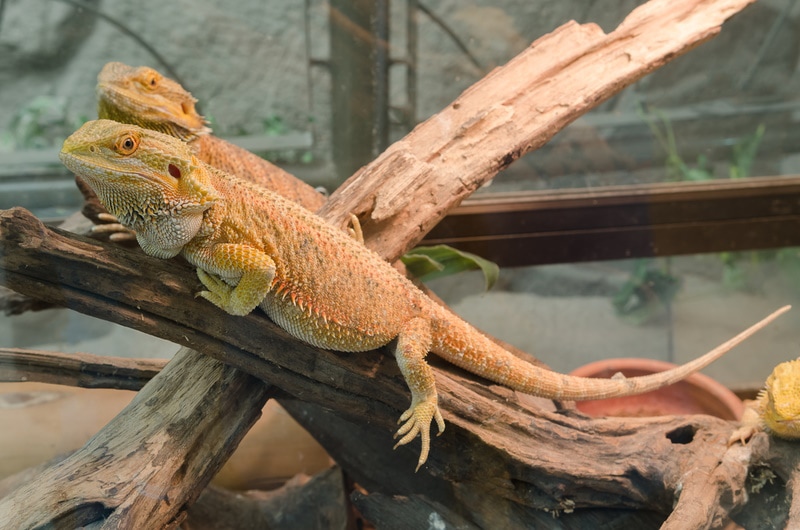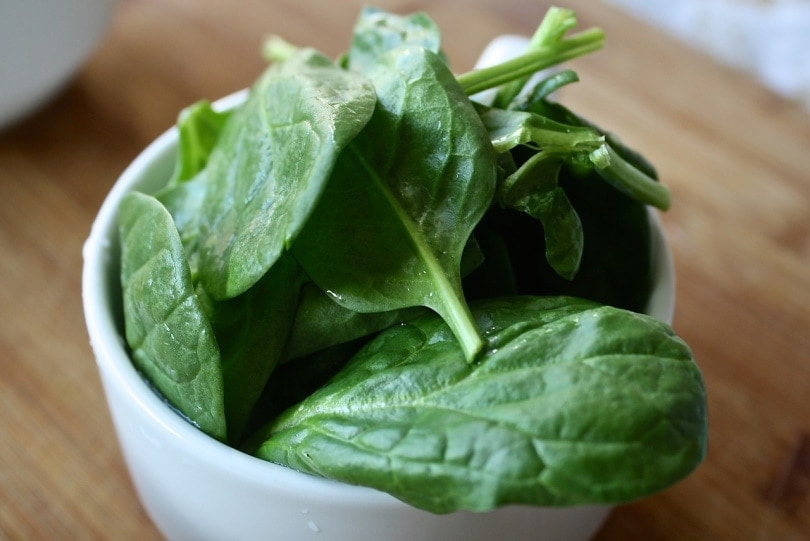Can Bearded Dragons Eat Chocolate? Vet Approved Nutrition Facts

Updated on
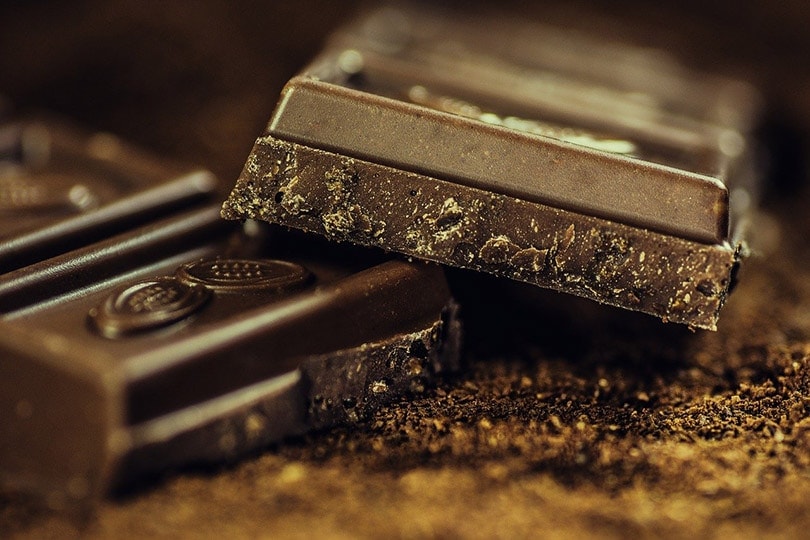
If you’ve had a pet before, it probably won’t surprise you that Bearded Dragons can’t eat chocolate. But you might not know why. Bearded dragons are omnivores and should eat around 20% animal and 80% plant-based material, and sweet treats like chocolate have no place in their diet. Chocolate is also toxic to Bearded Dragons, and we’ll discuss why next.

Why Bearded Dragons Can’t Eat Chocolate
There are various reasons your Beardie can’t eat chocolate, some more serious than others. All chocolate products will have different nutritional information depending on the brands and type, but they all will contain the same problematic components.
Calories
Bearded dragons in captivity don’t need to consume as many calories as they use much less energy than their wild counterparts. Young Bearded Dragons need to be fed a diet of 80% protein, twice a day, to sustain their growth, but older Beardies may only need to be fed every 24–48 hours. Bearded dragons also have small stomachs that can fill up quickly. This means that what your Bearded Dragon eats should be nutritionally beneficial, or they will miss out on everything they need to stay healthy and strong.
Fat and Sugar
As we know, chocolate is fatty and has a high sugar content, and reptiles should avoid eating sugar and excessive amounts of fat. Even insects known to be high in fat, like wax worms or hornworms, should only be given to a Beardie occasionally. Like humans, obesity can lead to several problems in Bearded Dragons.
Sugar can also result in tooth decay, which is painful and can prevent your lizard from eating as they should.
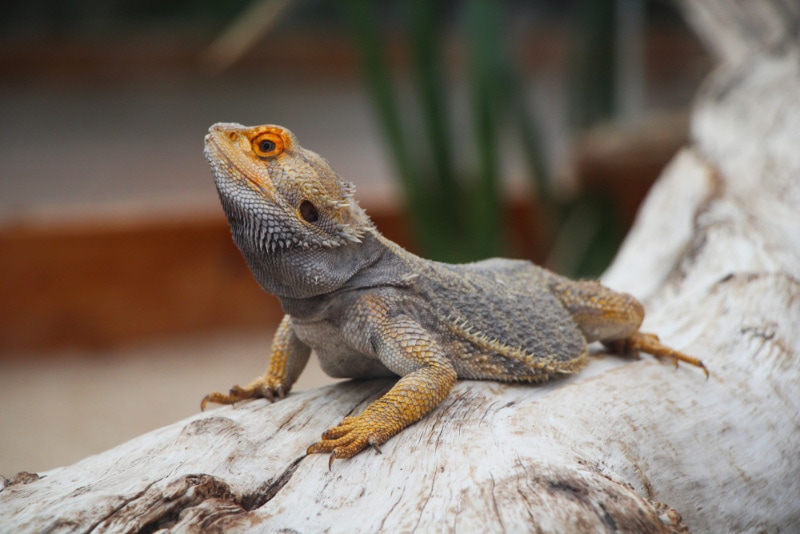
Phosphorus and Calcium
Phosphorus and calcium are essential nutrients that help keep your Bearded Dragon healthy. The ideal ratio is 2:1, with calcium being higher than phosphorus, but chocolate tends to have higher phosphorus levels, as shown in our example.
This is dangerous because the phosphorus binds with the calcium and prevents your pet from absorbing calcium. This can result in a dangerous health condition called metabolic bone disease (MBD), which can cause bone fractures and even be fatal if managed improperly.
Theobromine and Caffeine
Theobromine and Caffeine are the primary ingredients that make chocolate toxic to dogs and other animal species. At high enough levels, these chemicals can also be toxic to humans, but we would need to consume a virtually impossible amount of chocolate for it to actually cause any significant effects (though I’m sure many have tried!). Although there is little data to indicate how much chocolate would constitute a toxic dose in reptiles, it is understood that they are still susceptible to its effects, which include damage to the heart and muscles, respiratory disturbances, and disruption of the central nervous system.

What Should You Feed Your Bearded Dragon?
Bearded dragons need a simple but varied diet. They enjoy eating crickets, roaches, locusts, mealworms, and vegetables like kale, broccoli, dandelion leaves, and bell peppers. But they can also eat a little fruit in moderation, such as apricots, papayas, raspberries, blueberries, and strawberries.
Additionally, your Beardie may require supplements to ensure they get all the calcium and vitamin D they require, so it is important to speak to your vet or reptile specialist to make sure you are providing everything they need.
Not all insects, vegetables, and fruits are suitable for Bearded Dragons, so always check before giving them something new. You can ask your vet for advice if you’re unsure about their diet.
Food You Should Avoid Feeding Your Bearded Dragon
Whether cooked or raw, onions, garlic, leeks, and chives are unsuitable for your Bearded Dragon since they’re part of the allium family of vegetables, which can cause damage to blood cells. Avocados and rhubarb are also considered harmful to bearded dragons, as are mushrooms and citrus fruits.
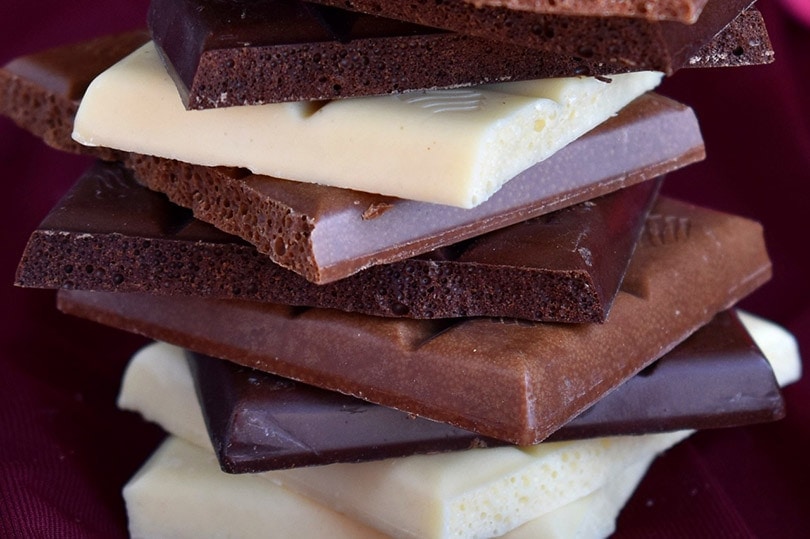

Conclusion
Bearded dragons can’t eat chocolate. It is unhealthy and can cause serious health problems and is, therefore, a completely unsuitable treat. A Beardie’s diet is simple but variation is vital; they can eat various insects, leafy greens, and the odd fruity treat as well.
It might seem like the diet of a Bearded Dragon is a bit boring without the delight of chocolate, but rest assured, they are satisfied with their tasty insects and greens. If you want to give them something special, a juicy hornworm is a great choice, and keep the chocolate to yourself!
Featured Image Credit: Alexander Stein, Pixabay


